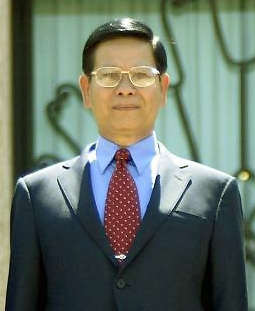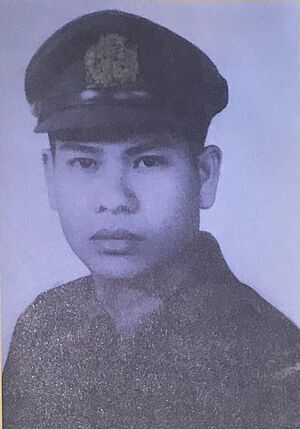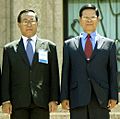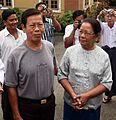Khin Nyunt facts for kids
Quick facts for kids
Khin Nyunt
|
|
|---|---|
|
ခင်ညွန့်
|
|

Khin Nyunt in 2004
|
|
| Prime Minister of Myanmar | |
| In office 25 August 2003 – 18 October 2004 |
|
| Leader | Than Shwe |
| Preceded by | Than Shwe |
| Succeeded by | Soe Win |
| Secretary 1 of the State Peace and Development Council | |
| In office 15 November 1997 – 25 August 2003 |
|
| Preceded by | Position established |
| Succeeded by | Soe Win |
| Secretary 1 of the State Law and Order Restoration Council | |
| In office 18 September 1988 – 15 November 1997 |
|
| Preceded by | Position established |
| Succeeded by | Position abolished |
| Director of Defence Service Intelligence | |
| In office 1984 – 18 October 2004 |
|
| Preceded by | Kyaw Win |
| Succeeded by | Myint Swe |
| Personal details | |
| Born | 23 October 1939 Kyauktan Township, British Burma (present-day Myanmar) |
| Citizenship | Burmese |
| Spouse | Khin Win Shwe |
| Children | Lt.-Col. Zaw Naing Oo, Dr. Ye Naing Win |
| Alma mater | Officers Training School, Bahtoo |
| Military service | |
| Allegiance | |
| Branch/service | |
| Years of service | 1960–2004 |
| Rank | |
Khin Nyunt (Burmese: ခင်ညွန့်; MLCTS: hkang nywan; pronounced [kʰɪ̀ɰ̃ ɲʊ̰ɰ̃]; born 23 October 1939) is a retired army general from Myanmar. He was an important figure in Myanmar's government for many years. He served as the country's Prime Minister from August 2003 to October 2004. Before that, he was the Chief of Intelligence.
During his time in power, Khin Nyunt worked on improving national security and government policies. He was known for trying to modernize the country's intelligence work. However, his time as Prime Minister was short. He was removed from his position in 2004 due to changes within the military government.
Khin Nyunt was born in Kyauktan Township, near Rangoon (now Yangon). His family had a unique background, with parents from Hakkas in China. He joined the military and graduated from the Officers Training School, Bahtoo in 1960. His career led him to key roles in the country's security and political life.
Contents
Early Life and Education

Khin Nyunt was born on October 23, 1939, in Kyauktan Township. This area is close to Rangoon, which is now known as Yangon. His family had Burmese Chinese roots. His parents were from the Hakka group, originally from Meixian in Guangdong, China.
He attended Yankin College for a while in the late 1950s. Later, he joined the military. In 1960, Khin Nyunt graduated from the 25th class of the Officers Training School, Bahtoo. This training prepared him for his long career in the armed forces.
Political Career and Leadership
After his military training, Khin Nyunt became a key figure in Myanmar's government. In 1984, he was called back to Rangoon after a serious attack on a visiting group from South Korea. This event led to his appointment as Chief of Intelligence.
For many years, from the mid-1980s to the late 1990s, Khin Nyunt was seen as a close associate of General Ne Win. Even after General Ne Win officially retired, he was thought to still have a lot of influence behind the scenes.
Forming the Government Council
In 1988, there was a large protest movement known as the 8888 Uprising. The military stopped these protests. On September 18, 1988, a new military government was formed called the State Law and Order Restoration Council (SLORC).
This council was later renamed the State Peace and Development Council (SPDC) on November 15, 1997. Khin Nyunt was chosen as its first secretary, a very important position. He held this role until he became Prime Minister in August 2003.
Roadmap for the Future
Soon after becoming Prime Minister, Khin Nyunt announced a plan called the seven-point roadmap to democracy on August 30, 2003. This plan was meant to guide Myanmar towards a more democratic future.
However, many people, including those who wanted more democracy in Myanmar and some foreign governments, had concerns about this roadmap. They felt it did not clearly state how democracy would be achieved. They also worried that it allowed the military to keep too much power in the government. The plan also did not include a timeline for when these changes would happen.
The first step of this roadmap was to bring back the National Convention. This group had first met in 1993. Its purpose was to create the basic rules for a new Constitution for Myanmar. The National Convention met on and off until a new constitution was approved in 2008.
Time as Prime Minister
When Khin Nyunt became Prime Minister, some people hoped that there might be more openness in the government. He was seen by some as a moderate leader who understood the need to talk with those who wanted more democracy.
However, other powerful military leaders, like Senior General Than Shwe, were seen as strict and against making big changes. They wanted the military to keep strong control over the country.
Challenges and Changes
During his time in power, Khin Nyunt was involved in managing the country's internal security. His intelligence units worked to keep order and gather information. They were involved in monitoring various groups and activities across the country.
Khin Nyunt also played a role in decisions about education. Universities were closed at one point and then reopened in new locations. These new campuses were often far away and not as well-equipped. This made it harder for students to organize protests or get the same quality of education.
Later Life and Release
On October 18, 2004, Khin Nyunt was removed from his position as Prime Minister. The government announced that he was "permitted to retire on health grounds." However, he was immediately placed under house arrest.
This change was part of a power shift within the military government. The leader, Than Shwe, wanted to reduce the influence of the intelligence branch that Khin Nyunt led. Many generals in the government did not want to negotiate with Aung San Suu Kyi and her political party, the National League for Democracy.
Khin Nyunt was later tried by a special court. He was given a long sentence, but he served it under house arrest instead of in prison. His sons also received sentences.
In July 2009 and December 2010, videos of Khin Nyunt meeting with people outside his home were shared. This showed that he had some freedom to move around. On January 13, 2012, Khin Nyunt was officially released from house arrest by order of President Thein Sein.
Life After Release
After his release, Khin Nyunt moved into a home in Yangon. He started a new chapter in his life. He opened a coffee shop, an art gallery, and a souvenir shop. These shops sold items like wood carvings to tourists.
In March 2015, Khin Nyunt published a book about his life. It was 657 pages long and shared many details about his experiences. More recently, in December 2021, Senior General Min Aung Hlaing, the current military leader, visited Khin Nyunt at his home. It has been reported that Khin Nyunt is facing health issues, including Alzheimer's disease.
Personal Life
Khin Nyunt is married to Khin Win Shwe, who is a medical doctor. They have two sons together. He also has seven grandchildren.
Images for kids
 | Percy Lavon Julian |
 | Katherine Johnson |
 | George Washington Carver |
 | Annie Easley |




